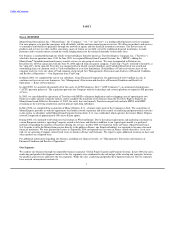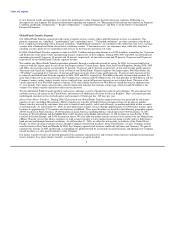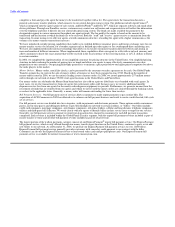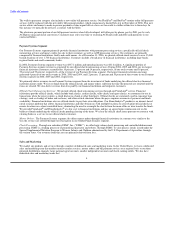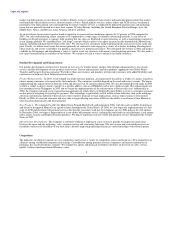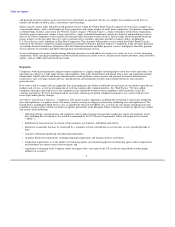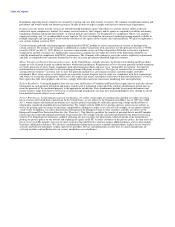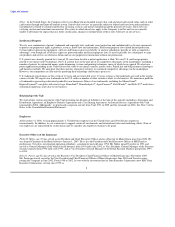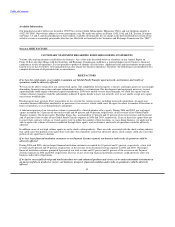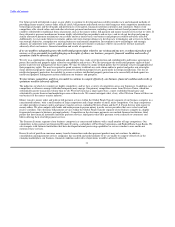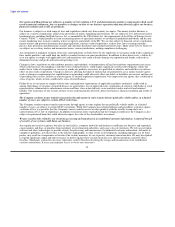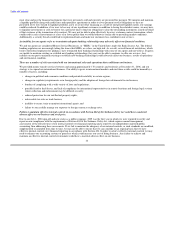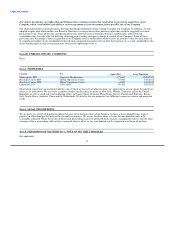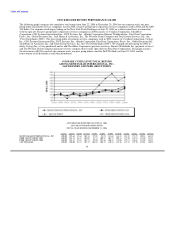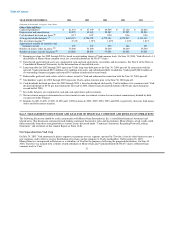MoneyGram 2006 Annual Report Download - page 14
Download and view the complete annual report
Please find page 14 of the 2006 MoneyGram annual report below. You can navigate through the pages in the report by either clicking on the pages listed below, or by using the keyword search tool below to find specific information within the annual report.
Table of Contents
Our future growth will depend, in part, on our ability to continue to develop and successfully introduce new and enhanced methods of
providing money transfer, money order, official check, bill payment and related services that keep pace with competitive introductions,
technological changes and the demands and preferences of our agents, financial institution customers and consumers. Many of our
competitors offer stored-value cards and other electronic payment mechanisms, including various internet-based payment services, that
could be substituted for traditional forms of payment, such as the money orders, bill payment and money transfer services that we offer. If
these alternative payment mechanisms become widely substituted for our products and services, and we do not develop and ramp up
similar alternative payment mechanisms successfully and on a timely basis, our business and prospects could be adversely affected.
Additionally, we may make future investments and/or enter into strategic alliances to develop new technologies and services to further
our strategic objectives, strengthen our existing businesses and remain competitive. Investments in new technologies and strategic
alliances are inherently risky and we cannot guarantee that such investments or alliances will be successful or will not materially
adversely affect our business, financial condition and results of operations.
If we are unable to adequately protect the intellectual property rights related to our existing and any new or enhanced products and
services, or if we are unable to avoid infringing on the rights of others, our business, prospects, financial condition and results of
operations could be adversely affected.
We rely on a combination of patent, trademark and copyright laws, trade secret protection and confidentiality and license agreements to
protect the intellectual property rights related to our products and services. We also investigate the intellectual property rights of third
parties to prevent our infringement of those rights. We may be subject to claims of third parties that we infringe or have misappropriated
their proprietary rights. We may be required to spend resources to defend any such claims and/or to protect and police our own rights.
Some intellectual property rights may not be protected by intellectual property laws, particularly in foreign jurisdictions. The loss of
intellectual property protection, the inability to secure or enforce intellectual property protection or to successfully defend against an
intellectual property infringement action could harm our business and prospects.
We face intense competition, and if we are unable to continue to compete effectively, our business, financial condition and results of
operations would be adversely affected.
The industries in which we compete are highly competitive, and we face a variety of competitors across our businesses. In addition, new
competitors or alliances among established companies may emerge. Our primary competition comes from Western Union, which has
substantially greater transaction volume than we do. Western Union has a larger agent base, a more established brand name and
substantially greater financial and marketing resources than we do. We cannot anticipate what, if any, effect Western Union will have on
our business or the money transfer industry.
Money transfer, money order and walk-in bill payment services within the Global Funds Transfer segment of our business competes in a
concentrated industry, with a small number of large competitors and a large number of small, niche competitors. Our large competitors
are other providers of money orders and money transfer services, including Western Union and the U.S. Postal Service with respect to
money orders. We also compete with banks and niche person-to-person money transfer service providers that serve select send and
receive corridors. The electronic bill payment services within the Global Funds Transfer segment of our business compete in a highly
fragmented consumer to business payment industry. Competitors in the electronic payments area include financial institutions, third
parties that host financial institution and biller payment services, third parties that offer payment services directly to consumers and
billers offering their own bill payment services.
The Payment Systems segment of our business competes in a concentrated industry with a small number of large competitors. Our
competitors in this segment are Integrated Payment Systems, a subsidiary of First Data Corporation, and Federal Home Loan Banks. We
also compete with financial institutions that have developed internal processing capabilities or services similar to ours and do not
outsource these services.
Recent levels of growth in consumer money transfer transactions and other payment products may not continue. In addition,
consolidation among payment services companies has occurred and could continue. If we are unable to compete effectively in the
changing marketplace, our business, financial condition and results of operations would be adversely affected.
11


